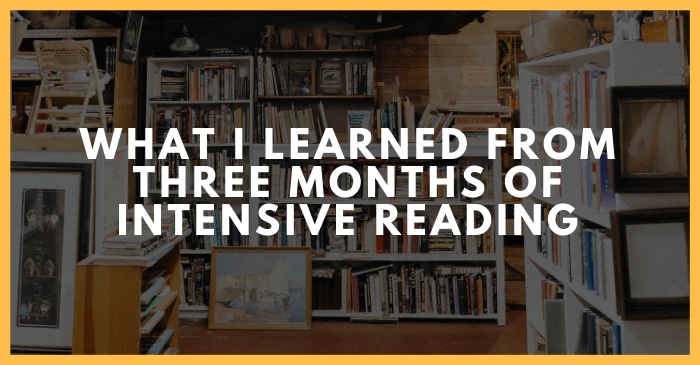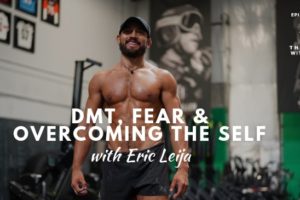As I began my journey to be an writer, I immediately ran into a huge roadblock. Where should I start?
Luckily, I found my answer while reading Stephen King’s memoir, On Writing. King has published over sixty novels, so when he says that “If you don’t have the time to read, you don’t have the time or the tools to write,” I figured I ought to listen.
Another question arose. How much should I be reading?
Stephen says he’s a slow reader, and that he ingests “only eighty books a year.”
My jaw nearly dropped to the floor. Eighty books a year?! Thanks impossible! I’ll never be able to be a writer!
I caught myself in the midst of crafting this limiting belief and figured that I should start simply. I’ll read more than I already do.
So, at the beginning of February 2016, I began reading as much as I could—intensively, by my own standards—and emerged from the challenge having read ten books in three months. It’s nothing worth bragging about, but if I can keep up the pace, I’ll have read forty books by the end of this year. Not too shabby considering I hardly ever read. These three months spent reading made me a better writer and inspired me to be a better person.
Here’s what I learned:
Read Deep and Wide
Read a wide spectrum of authors from mutliple different genres for a richer writing style. This includes selecting both fiction and non-fiction books. During these three months of intensive reading, I fell in love with a single author and immersed myself deeply into his work (thank you, Hesse!) It was wonderful to know I connect deeply with a single author’s work, but there comes a time when you need to branch out to absorb different writing styles.
We Read Books, But We Also Read Authors
A book is a gateway into the mind of the author. Reading gives us instant access into some of the greatest minds of all time! If we read a book, we’ve siphoned a piece of the author’s mind into our subconscious. Their work will no doubt permeate into our writing. That’s good news for us.
Don’t Compare Your Writing to that of Other Writers
It’s easy to get sucked into thinking your writing is terrible as you continue to read various classics, literature, published poems, and epic novels. This a trap! Only compare your writing to your old writing.
The Author Is Everywhere and Nowhere
Each and every character of a novel, not only the protagonist, comes from the author’s imagination. Therefore, each is a reflection of the author’s inner-self. It’s a fallacy to assume she’s only the lead character. Each is a creation stemming from their own mind, of their own doing. Therefore, the author is present both everywhere and nowhere in the story. *mind blown*
The Best Stories Do Not Reveal Too Much
They give only what is required. Nothing more, nothing less. The best stories capture the reader’s mind and take them on a journey. The hook is then pulled from their mouth as they are released back into the stream of life to explore the meaning of its surroundings with newfound perspective. Although a reader may or may not have physically moved during this process, by the end they have found themselves somewhere different, somewhere nowhere near where they began. Sometimes the best stories leave the reader with more questions than when they began.
Everything is a Remix
You’ve heard it before but I’ll say it again: nothing is completely original. We stand on the shoulders of giants. Whatever you’re reading, it’s likely someone took it from someone else that came before them and made it their own by adding a twist or their own flavor. Why reinvent the wheel when it’s already been built?
The origins of most stories we hear these days likely came from either the Bard, the Bible, the Greeks, or Fairy Tales. I learned this from a lovely book I’ve been reading… about reading called How to Read Literature Like A Professor. I can’t recommend this book enough to future writers.
Writers Don’t Write for the Sake of Writing
They write because they have 1) a story to tell or 2) a question they’re looking to answer. What is the author is trying to say to the world? What question did he set out to answer? What is she trying to learn about herself? And for you, what is it you are trying to say to the world, or what questions do you need answering? Start writing and see where it takes you.
Read to Understand, Not to Finish
I’m a slow reader, but that’s okay. Instead, I’m deliberate. I study the words carefully, words that were so carefully and meaningfully selected by the author. I take notes on phrasing, pacing, voice, and style. Finishing is the last thing I worry about.
Don’t Be Afraid to Set the Book Aside
If you can’t finish a book or you don’t find it interesting, put it away for another time. The last thing you want to do is be reading books you don’t connect with. Monitor your attention as you read, and sure you’re engaged along the way.
Reading is Meditative
It may not be a substitute for maintaining formal meditation practice, but reading does have similar qualities to meditation. Concentration and focus are demanded for long periods of time, our sense of self and time distorts and disappears, and a psychological flow state can be induced. There’s nothing better than reading right before bedtime to get some really great sleep.
A Writer is a Reader, But He Must Also Write
If you want to write, you must read, but you must also write! Be sure to find your balance between the two. Know when it’s time to set down the book and pick up the pen…or keyboard!
It’s a Long Way to the Top of the Mountain
I’ll need to double my 10 books/month pace to catch Mr. King. But then again the race isn’t against Stephen. It’s against myself. It always is. At the same time, I realize that “the top” doesn’t exist. As of today, I’m ready to write with the best of them — and you are too!
Too often we crave instant results when it’s all about the slow roll. We look to those above us, the ones that make it seem so easy, but what they do behind the scenes is never seen and makes all the difference.
Cheers and happy reading to ya!





2 Comments
Leave your reply.